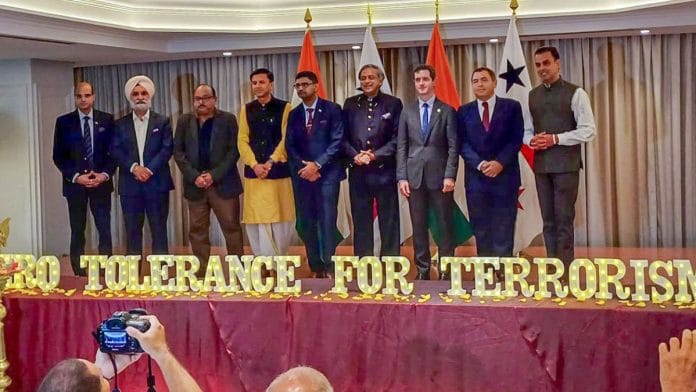Many have jumped in to criticise India’s decision to send all-party delegations to global capitals post-Pahalgam. Why do we need to explain ourselves? Why seek the world’s approval? But the truth is—we’re not living in isolation. We’re part of a global system, and narratives matter. The same people who question this initiative often complain, day in and day out, about how unfair the international media is toward India. If that’s the case, then isn’t it necessary to speak up, to engage, to write our own stories in our own words—before others write them for us?
While the world has slowly woken up to the threat of terrorism—especially the kind rooted in Islamist ideologies—India has lived in its shadow for decades. What many outside don’t fully grasp is that this isn’t new for us. Bleed India with a Thousand Cuts is not just a fancy phrase, it’s a doctrine—a long-standing military strategy, openly followed by the Pakistani establishment. The idea has always been simple and sinister: Use terror to destabilise, divide, and exhaust India from within by fuelling insurgency, funding radicalisation, and turning religion into a weapon.
We’ve lost soldiers, schoolchildren, daily wage workers, and pilgrims. Every kind of Indian. This war isn’t fought on conventional battlegrounds, but in bazaars, buses, temples, and now even tourist spots. And yet, somehow, every time we respond, we’re asked why. As if self-defence must first ask for approval.
So let it be said clearly: When India responds to terror, it isn’t revenge—it’s resistance. It’s the bare minimum a sovereign nation owes to its people. There comes a point where silence is complicity, and restraint starts to look like surrender.
And the world needs to hear about this. Global narratives still shape global sympathies. And in a world quick to comment but slow to understand, telling our story—in our words—is not seeking validation, it’s setting the record straight.
Also read: The world sees Ali Khan Mahmudabad’s arrest first, not all-party delegations
In one voice
So far, India seems to be receiving the kind of response that validates this effort. Reports suggest that several countries are aligning with India’s zero-tolerance stance on terrorism. Saudi Arabia has expressed support, stating it stands with India in its fight against terror from Pakistan. Italy has offered bilateral cooperation. Indonesia, too, has extended its support. France has reiterated its solidarity and called on the democratic world to speak in one voice against terrorism. These aren’t just diplomatic niceties—they’re acknowledgements that India’s fight is not isolated, nor unjustified.
However, what stands out most about this delegation is not just the diplomacy—it’s the image of Indians from every political party, every faith, every background, coming together to represent one country, with one voice. That’s the real beauty of India. Unity in diversity isn’t just a slogan—it’s a lived reality. When people, despite their differences, set them aside to speak as one, to stand for India, that itself tells you what this country means. It’s not uniformity. It’s not sameness. It’s strength in difference. That’s the soul of India.
Even Al Jazeera, never one to go easy on India, made a note of it: “Inside India’s Parliament, they are sworn rivals… but over the past few days, they have [come together].” And that’s the quiet success of this delegation—reminding the world that this isn’t about party lines or warmongering. It’s about a nation that’s tired.
When AIMIM MP Asaduddin Owaisi told Middle Eastern leaders that Pakistan is the aggressor, not the victim, the message was clear. This was never a fight between religions. It’s a fight for coexistence, against a mindset that sees supremacy as identity. And when voices as different as Owaisi’s and the BJP’s say the same thing abroad, it’s no longer just diplomacy, it’s a shared truth India is finally done apologising for.
This moment sends a message to our nation as well. If we are to speak of unity, justice and truth abroad, we must also uphold these values at home. The credibility of our global message depends on the strength of our democracy, the fairness of our institutions, and the freedoms we guarantee to our people. Our external assertiveness must be matched by internal integrity.
In the end, if there’s a message this delegation carries, it is this: India is not asking for sympathy. It is standing with dignity. Tired, maybe—but not defeated. Still choosing dialogue—but unwilling to be silent. This is what it means to be a nation that has suffered much, but still believes in the possibility of peace built not on denial, but on truth.
Amana Begam Ansari is a columnist, writer, TV news panelist. She runs a weekly YouTube show called ‘India This Week by Amana and Khalid’. She tweets @Amana_Ansari. Views are personal.
(Edited by Theres Sudeep)







Are they. Quint has studied the seven delegations before their trips concluded. Three metrics. Level of government officials they met with. Official posts from social media handles. Coverage in top level local media. Very faint impact. What merits study is that the most important delegation, led by Dr Shashi Tharoor, did not meet any government officials in the US.